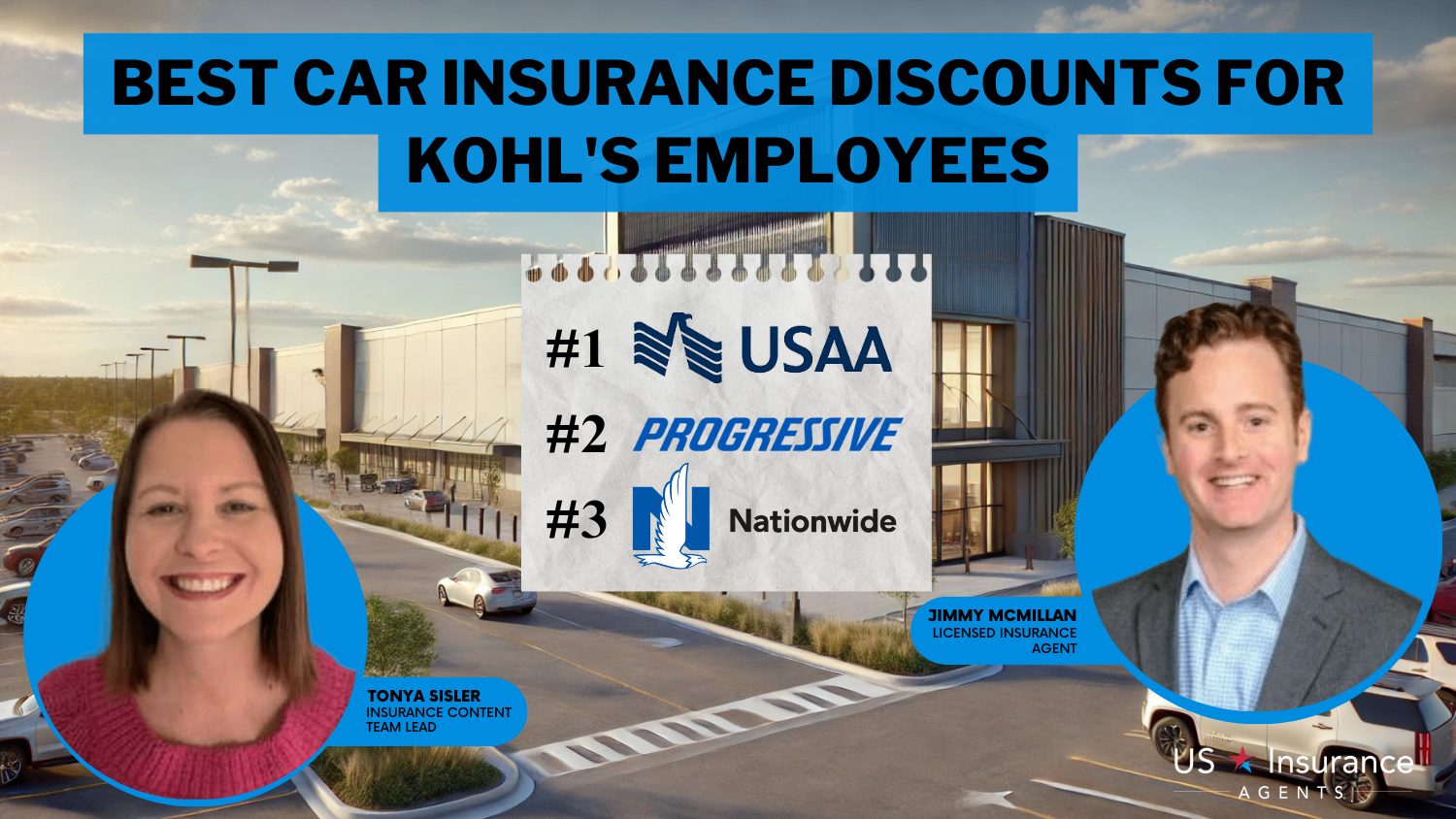Car Seat Laws in West Virginia
Understanding Car Seat Laws in West Virginia: What You Need to Know to Keep Your Child Safe on the Road
Secured with SHA-256 Encryption





Table of Contents
Table of Contents


Licensed Insurance Broker
Zach Fagiano has been in the insurance industry for over 10 years, specializing in property and casualty and risk management consulting. He started out specializing in small businesses and moved up to large commercial real estate risks. During that time, he acquired property & casualty, life & health, and surplus lines brokers licenses. He’s now the Senior Vice President overseeing globa...
Zach Fagiano


Sr. Director of Content
Sara Routhier, Senior Director of Content, has professional experience as an educator, SEO specialist, and content marketer. She has over 10 years of experience in the insurance industry. As a researcher, data nerd, writer, and editor, she strives to curate educational, enlightening articles that provide you with the must-know facts and best-kept secrets within the overwhelming world of insurance....
Sara Routhier


Licensed Insurance Agent
Kristine Lee is a licensed insurance agent and one of The Zebra’s in-house content strategists. With a background in copywriting, she covers the ins and outs of the home and car insurance industries. She has been a contributor to numerous publications focused on the nuances of insurance, including on The Points Guy.
Kristine Lee
Updated September 2024
Car seat laws are an essential aspect of child safety, ensuring that children are properly restrained while traveling in a vehicle. West Virginia, like many other states, has specific regulations in place to protect young passengers. Understanding these laws is crucial for parents and guardians to ensure the safety of their children on the road.
Understanding the Importance of Car Seat Laws
Car seat laws play a vital role in safeguarding children during car journeys, significantly reducing the risk of injuries and fatalities in the event of a collision. Accidents can happen unexpectedly, and without the appropriate car seat, children are at a higher risk of severe injuries or even death.
West Virginia recognizes the significance of car seat laws in protecting young passengers and has implemented strict regulations to promote child safety on the road.
The Role of Car Seat Laws in Child Safety
Car seat laws serve as a protective measure for children, ensuring they are secured in a proper restraint system appropriate for their age, weight, and height. These laws outline specific guidelines that parents and guardians must follow when transporting children in vehicles.
Children are more vulnerable to injuries due to their smaller size and less developed skeletal structures. Car seat laws address these vulnerabilities by requiring parents and guardians to utilize car seats that provide the necessary support and protection for children in the event of a collision.
Car seats are designed to absorb the impact of a crash and distribute the forces across the strongest parts of a child’s body, such as the shoulders, hips, and upper thighs. They reduce the risk of head and spinal injuries by providing a protective cocoon around the child, preventing excessive movement during a collision.
Furthermore, car seat laws take into account the different stages of a child’s growth and development. They mandate the use of rear-facing car seats for infants and toddlers, as their necks and spines are not strong enough to withstand the forces of a forward-facing collision. As children grow older, car seat laws require the transition to forward-facing seats and eventually booster seats, ensuring the appropriate level of protection at each stage.
Why West Virginia Takes Car Seat Laws Seriously
West Virginia prioritizes the safety of its young residents and takes car seat laws seriously. The state recognizes the importance of adequately protecting children and reducing the risk of injuries in car accidents.
By enforcing strict car seat laws, West Virginia aims to raise awareness among parents and guardians about the significance of proper child restraints while traveling in a vehicle. By complying with these laws, caregivers can actively contribute to keeping their children safe on the road.
Additionally, West Virginia has implemented various educational programs and initiatives to educate parents and caregivers about the importance of car seat safety. These programs provide resources and information on selecting, installing, and using car seats correctly. They also offer guidance on how to properly secure children in car seats and ensure a snug fit for maximum protection.
West Virginia’s commitment to car seat laws is further exemplified by its rigorous enforcement and penalties for non-compliance. Law enforcement agencies actively monitor and enforce these laws, conducting regular checks and issuing citations to individuals who fail to adhere to the regulations. By implementing these measures, West Virginia aims to create a culture of child safety, where the use of car seats becomes a norm rather than an exception.
Free Auto Insurance Comparison
Compare Quotes From Top Companies and Save
Secured with SHA-256 Encryption
Overview of West Virginia’s Car Seat Laws
West Virginia takes the safety of young passengers seriously and has implemented comprehensive car seat laws to protect them. These laws are designed to address the different stages of a child’s growth and development, ensuring that they are properly secured in a car seat or booster seat appropriate for their age and size. It is crucial for parents and guardians to understand and comply with these regulations to ensure the safety of their children.
Rear-Facing Car Seat Laws
West Virginia’s car seat laws require infants and toddlers to be secured in a rear-facing car seat until they reach the age of two or meet the weight and height limit specified by the car seat manufacturer. Rear-facing car seats are specifically designed to provide crucial support to a young child’s developing head, neck, and spine. They distribute crash forces more evenly during a collision, reducing the risk of severe injuries.
It is important for caregivers to carefully follow the manufacturer’s instructions regarding the weight and height limits of the rear-facing car seat. Each seat may have different specifications, and it is essential to ensure that the child remains within the appropriate range for optimal safety.
Forward-Facing Car Seat Laws
Once a child outgrows the rear-facing car seat, West Virginia’s car seat laws require them to transition to a forward-facing car seat. This transition typically occurs around the age of two or when the child reaches the weight and height limit specified by the car seat manufacturer.
Forward-facing car seats provide additional protection for children, as they are equipped with built-in harness systems designed to secure them firmly during a collision. Caregivers should pay close attention to the proper adjustment of the harness, ensuring that it fits the child snugly for maximum safety.
Booster Seat Laws
West Virginia’s car seat laws also address the use of booster seats, which are necessary for children who have outgrown forward-facing car seats but are not yet tall enough to use a standard seat belt safely.
According to West Virginia law, children must use a booster seat until they reach the age of eight or stand taller than four feet nine inches. Booster seats elevate a child to a position suitable for the proper use of a seat belt, ensuring that the belt is positioned correctly across the child’s chest and hips. This minimizes the risk of injury in the event of a crash, providing an additional layer of protection.
It is important for caregivers to understand that car seat laws are in place to safeguard children and should be followed diligently. Regularly checking for updates and staying informed about any changes to the regulations is crucial to ensure compliance and the continued safety of young passengers.
Penalties for Violating Car Seat Laws in West Virginia
West Virginia has penalties in place for those who violate car seat laws. It is crucial to understand these consequences to encourage compliance and prioritize child safety.
Ensuring the safety of children while traveling in a vehicle is of utmost importance. Car seat laws in West Virginia are designed to protect young passengers from potential injuries or fatalities in the event of a collision. Violating these laws can have serious consequences, both in terms of financial penalties and the potential impact on one’s driving record.
Fines and Penalties
Violating car seat laws in West Virginia can result in fines and penalties. The specific amount may vary depending on the offense and the number of previous violations. It is essential to remember that any amount of fine is insignificant compared to the potential harm that may befall a child without proper restraint.
Law enforcement agencies in West Virginia take car seat violations seriously. They recognize the importance of child safety and strive to enforce these laws to protect the well-being of young passengers. By adhering to car seat laws, parents and guardians can not only avoid financial penalties but, more importantly, provide the highest level of safety for their children.
It is worth noting that the fines associated with car seat violations can vary depending on the severity of the offense. For first-time offenders, the fine may be relatively lower, serving as a reminder to comply with the law. However, repeat offenders may face significantly higher fines, reflecting the need for stricter enforcement to ensure child safety.
Impact on Driving Record
In addition to fines, violations of car seat laws in West Virginia may have an impact on an individual’s driving record. Accumulating multiple violations can result in points being added to a driver’s record, potentially leading to increased insurance premiums and license suspensions.
Having points on one’s driving record can have various implications. Insurance companies consider a driver’s record when determining premiums, and multiple car seat violations can lead to higher rates. Additionally, accumulating too many points within a specific time frame can result in a driver’s license suspension, further complicating one’s ability to commute or transport children safely.
By following car seat laws, caregivers can help maintain a clean driving record and prioritize the well-being of their children simultaneously. It is crucial to remember that the consequences of violating car seat laws extend beyond financial penalties. The safety and lives of young passengers are at stake, making compliance with these laws a responsibility that should not be taken lightly.
How to Properly Install Car Seats
Proper installation of car seats is of utmost importance to ensure the child’s safety. Inadequate installation can compromise the effectiveness of the car seat, leaving the child exposed to increased risk during a collision. Understanding the installation process and following the instructions provided by the car seat manufacturer is vital.
Installation Tips for Rear-Facing Seats
When installing a rear-facing car seat, it is crucial to place it in the back seat of the vehicle. The car seat should be secured tightly using the seat belt or the lower anchors, ensuring little to no movement. Additionally, caregivers should avoid using additional accessories that haven’t been tested or approved by the car seat manufacturer, as they may interfere with the seat’s effectiveness.
It is recommended to consult the car seat manufacturer’s instructions for specific installation steps for the particular model being used.
Ensuring a Secure Fit for Forward-Facing Seats
When transitioning to a forward-facing car seat, caregivers should follow the manufacturer’s instructions for appropriate installation. Securing the car seat with the seat belt or lower anchors is essential to minimize any movement during travel.
It is important to check the tightness of the harness straps to ensure a secure fit on the child. The chest clip should be positioned at armpit level, and the harness should be snug enough to pass the “pinch test” – unable to pinch any slack between fingers on the shoulder straps.
Correct Placement of Booster Seats
When using a booster seat, it is crucial to position it correctly in the vehicle. Boosters should be placed in the back seat and secured with the seat belt. The lap belt should rest low across the child’s hips, and the shoulder belt should cross the center of both the shoulder and chest.
The child should be reminded to keep the seat belt properly positioned and avoid placing it behind their back or under their arm, as this may reduce the effectiveness of the seat belt.
Free Auto Insurance Comparison
Compare Quotes From Top Companies and Save
Secured with SHA-256 Encryption
Frequently Asked Questions About West Virginia’s Car Seat Laws
When Can My Child Switch to a Booster Seat?
West Virginia’s car seat laws require children to remain in a booster seat until they reach the age of eight or stand taller than four feet nine inches. It is important to ensure that the child is adequately mature and developed enough to use a standard seat belt safely. A premature transition may expose the child to unnecessary risk in the event of a collision.
What if My Car Doesn’t Have a Back Seat?
It is generally recommended that children ride in the back seat of a vehicle as it offers the most protection in the event of a crash. However, if a vehicle does not have a back seat or it is not practical to place a child in the back seat, the child may ride in the front seat using the appropriate car seat or booster seat.
It is important to note that the front airbag must be disabled in this situation, as an active airbag can pose a significant risk to a child’s safety.
Can I Use a Second-Hand Car Seat?
When considering second-hand car seats, it is important to exercise caution. While it is legal to use a second-hand car seat in West Virginia, it is crucial to ensure that the seat is in good condition and has not been involved in a collision. Car seats have expiration dates, typically ranging from six to ten years, after which they may no longer provide optimal protection.
Additionally, it is essential to ascertain that the car seat has never been recalled and that all necessary parts and accessories are present. Following the manufacturer’s instructions for proper installation and use is crucial to ensure the car seat’s effectiveness.
By adhering to West Virginia’s car seat laws, parents and guardians can help safeguard their children during car journeys. These laws prioritize child safety and ensure that young passengers are appropriately restrained, significantly reducing the risk of injuries in the event of a collision. By following the proper installation guidelines and complying with these laws, caregivers can provide their children with the highest level of protection on the road.
Frequently Asked Questions
What are the car seat laws in West Virginia?
The car seat laws in West Virginia require children under the age of eight to be secured in a child safety seat or booster seat appropriate for their age, weight, and height.
At what age can a child stop using a car seat in West Virginia?
Children can stop using a car seat in West Virginia once they reach the age of eight or when they reach a height of 4 feet 9 inches.
What type of car seat should be used for infants in West Virginia?
Infants in West Virginia should be placed in rear-facing car seats until they reach the age of two or until they reach the weight and height limits specified by the car seat manufacturer.
Can a child use a booster seat in West Virginia?
Yes, once a child outgrows their forward-facing car seat, they should transition to a booster seat until they are at least eight years old or reach a height of 4 feet 9 inches.
Are there any exceptions to the car seat laws in West Virginia?
Yes, there are exceptions to the car seat laws in West Virginia. For example, if a child has a medical condition that prevents them from being safely restrained, they may be exempt from the requirements.
Can a child sit in the front seat of a vehicle in West Virginia?
It is recommended that children under the age of 13 should sit in the back seat of a vehicle in West Virginia. However, if the vehicle does not have a back seat or if all back seats are occupied by other children under the age of 13, a child may sit in the front seat using appropriate restraints.
Get a FREE Quote in Minutes
Insurance rates change constantly — we help you stay ahead by making it easy to compare top options and save.



